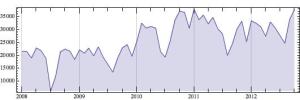Podcast: Play in new window | Download
By Sean Graham
It may be surprising to learn that I don’t go to a lot of big movie premieres – all the lights and cameras aren’t really my thing. But a few weeks ago I did have the privilege of going to the premiere of a new documentary from the Workers History Museum. Entitled ‘A Struggle to Remember: Fighting for our Families,’ the film documents the movement for family leave in Canada. Beautifully put together by director Aaron Floresco, the film follows the struggle from the the Royal Commission on the Status of Women in the late 1960s to today through first-person interviews from those involved in the movement. The film is the second production in this project, as the museum has also created a traveling exhibit on the history of family leave.
In this episode of the History Slam I talk with Arthur Carkner and Rosemary Warskett about both the project and the history of family leave in Canada. Both Arthur and Rosemary were involved in the struggle for family leave and offer some terrific insights into the process. In listening to them it becomes clear that the word ‘struggle’ is apt to describe the history of family leave in this country. The film itself is available for purchase and institutions can display the exhibit for free (if you’re outside Ottawa you have to provide shipping), both of which can be obtained by contacting the Workers History Museum. You can also follow
them on Twitter at @workershistory.
In addition, this is the final podcast of 2012 so I take a minute or two to thank some of the people who have been instrumental in getting the podcast going. I’ve had a blast putting them together and want to say thank you to everyone who has listened and subscribed on iTunes.
Have a great and safe holiday!
Sean Graham is a doctoral candidate at the University of Ottawa where he is currently working on a project that examines the early years of the Canadian Broadcasting Corporation. He has previously studied at Nipissing University, the University of the West Indies, and the University of Regina and like any red-blooded Canadian his ultimate dream is to be a curling champion while living on a diet of beer and poutine.






